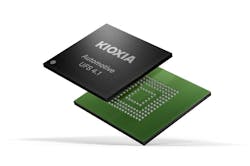UFS 4.1 Chip Handles Automotive Storage Chores
What you’ll learn:
- What is Universal Flash Storage (UFS)?
- Kioxia’s UFS 4.1 specs.
JEDEC’s Universal Flash Storage (UFS) 4.1 updated with a number of improvements, including host-initiated defragmentation, replay protected memory block (RPMB) authentication, and increased precision for enhanced memory logical units (LUs) that are needed to support QLC flash memory. The new standard is backwards compatible with UFS 4.x and 3.x. It employs the MIPI Alliance’s M-PHY version 5.0 specification that provides a bandwidth of 4.2 GB/s.
Kioxia’s UFS 4.1 for Cars and More
Kioxia America’s UFS 4.1 family supports the JEDEC standard and meets the requirements for automotive and other transportation applications (see figure). It’s available with capacities up to 1 TB and supports full-duplex operations. The chips utilize the company’s 3D flash-memory technology, BiCS Gen 8.
The most important aspect of the announcement is that the family meets automotive requirements. Cars are integrating a greater number of advanced driver-assistance systems (ADAS) that utilize artificial intelligence (AI). AI is more demanding when it comes to compute as well as storage. Likewise, memory and compute needs are expanding to support other automotive chores, from AI models to telematics to driver and passenger monitoring.
Kioxia’s UFS chip meets AEC-Q100/1044 Grade 2 standards. Maximum case temperature is 115°C. Overall, the UFS 4.1 chips more than double the speed compared to prior versions.
Check out more of our Future of Storage and Memory Conference 2025
About the Author
William G. Wong
Senior Content Director - Electronic Design and Microwaves & RF
I am Editor of Electronic Design focusing on embedded, software, and systems. As Senior Content Director, I also manage Microwaves & RF and I work with a great team of editors to provide engineers, programmers, developers and technical managers with interesting and useful articles and videos on a regular basis. Check out our free newsletters to see the latest content.
You can send press releases for new products for possible coverage on the website. I am also interested in receiving contributed articles for publishing on our website. Use our template and send to me along with a signed release form.
Check out my blog, AltEmbedded on Electronic Design, as well as his latest articles on this site that are listed below.
You can visit my social media via these links:
- AltEmbedded on Electronic Design
- Bill Wong on Facebook
- @AltEmbedded on Twitter
- Bill Wong on LinkedIn
I earned a Bachelor of Electrical Engineering at the Georgia Institute of Technology and a Masters in Computer Science from Rutgers University. I still do a bit of programming using everything from C and C++ to Rust and Ada/SPARK. I do a bit of PHP programming for Drupal websites. I have posted a few Drupal modules.
I still get a hand on software and electronic hardware. Some of this can be found on our Kit Close-Up video series. You can also see me on many of our TechXchange Talk videos. I am interested in a range of projects from robotics to artificial intelligence.



